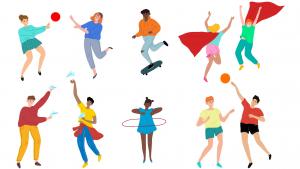There are at any given time about a thousand children deprived of their liberty in various institutions in England – that includes (from the latest available statistics) 436 children detained in mental health wards, 429 children in youth custody, and 103 children in secure children’s homes for their own welfare. This is what the official statistics tell us, but there are more children hidden from view. The reality is, we don’t know how many children are living away from home, or where. And that is something I’m really worried about.
That’s why I’m going to be doing several projects this year focussing on how we improve these children’s experiences and outcomes. They will be focussed on their views and voices. The first is around how we make sure no child is living in an institution – how we design and deliver a system where every child has a loving, stable home. The second is about making sure we know as much as possible the children who are subject to a Deprivation of Liberty (DoL) order.
Some children are ‘locked away’ in settings that are not designed as secure institutions – such as hotels or rented apartments – because nowhere appropriate can be found for them to stay safely. The numbers of these children is hard to find, but research has shown it could be over 300, and is possibly growing. I am pleased that the President of the Family Division has created a dedicated court for handling these children’s cases. My Help at Hand team has helped to support some of these children, who are often in the most precarious and risky situations. For example one 17 year old girl was placed in a secure children’s home. However, when this placement ended, she was moved into unregulated accommodation and was exploited by criminals. She was admitted to hospital under the Mental Health Act, but nobody could agree on where she should go next. She was moved to a house, rented by the local authority, with a Deprivation of Liberty Order authorisation, to allow care staff to restrain her if she tried to harm herself or others.
There are also changes being introduced to the way children can be deprived of their liberty. The reforms to the Mental Capacity Act will bring in the Liberty Protection Safeguards. These allow for children aged 16 and 17 lacking in capacity to be deprived of their liberty for their own safety. While this is sometimes sadly necessary, previously this was only possible with authorisation from a judge in the Court of Protection. My team is working to make sure that under the new systems, children’s rights are safeguarded, and their views continue to be taken into account. It is vital that children get the support they need to have their views heard, and that these views are respected. I also want to make sure that these safeguards aren’t used to place children in settings which aren’t right for them to get the therapeutic care they need.
While it is positive that the official numbers of children deprived of liberty have been falling in recent years, it is important that this doesn’t just mean children being deprived of liberty in other ways, which are harder to count and keep track of.
I want to see a future where no child has to live in an institution, including secure institutions. This will take intensive early intervention to identify children most at risk, working with them and their families, or specialist foster care where this is not possible. But, before we reach that point, some secure institutions will remain necessary. These settings need to be designed to consider all the needs a child may have – whether those are mental health needs, difficulty at home, or involvement in criminal activity.
The Secure School which is being piloted is one new approach, which will place education at the heart of a secure setting. I also want to see health and social care working closely together – under the new Integrated Care Systems – to design child-friendly, therapeutic places where children can go to recover and rebuild their lives, not simply be kept safe in the short term.






